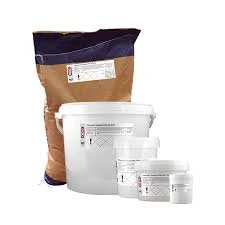
nbr nitrile rubber
Understanding NBR The Versatile Nitrile Rubber
Nitrile Butadiene Rubber (NBR), commonly referred to as nitrile rubber, is a synthetic rubber that has gained widespread popularity in various industries due to its excellent oil, fuel, and chemical resistance. This unique polymer is produced through the copolymerization of acrylonitrile and butadiene, resulting in a versatile material that excels in a variety of applications.
Properties of Nitrile Rubber
One of the primary characteristics of nitrile rubber is its impressive resistance to petroleum-based oils and chemicals. This makes it an ideal choice for applications in the automotive sector, where exposure to oils and fuels is common. NBR also boasts good resilience, abrasion resistance, and tear strength, which enhance its durability in challenging environments.
Furthermore, nitrile rubber has low gas permeability, making it suitable for manufacturing seals and gaskets that need to retain their integrity in gas exposure. Additionally, the degree of acrylonitrile content can be adjusted in NBR, allowing manufacturers to tailor its properties to meet specific requirements. Higher acrylonitrile content translates to better oil resistance but can reduce flexibility, while lower content improves flexibility at the expense of oil resistance.
Applications of Nitrile Rubber
The versatility of nitrile rubber ensures its applicability across various sectors. In the automotive industry, NBR is widely used for manufacturing O-rings, fuel hoses, gaskets, and seals. These components are vital for maintaining the performance and safety of vehicles, as they help prevent leaks and ensure proper functioning of various systems.
In the aerospace sector, nitrile rubber is employed in sealing applications that require resistance to fuel and oils present in aircraft engines. Its reliability in extreme conditions is crucial for maintaining air travel safety.
nbr nitrile rubber

Moreover, NBR is extensively utilized in the manufacturing of industrial components. Its resistance to a broad range of chemicals makes it suitable for use in pumps, valves, and hoses within chemical processing plants. The food industry also leverages nitrile rubber for products that require contact with food, thanks to its FDA-approved variants that ensure safety and compliance.
Advantages of NBR Over Other Rubbers
While there are various types of commercial rubbers available, nitrile rubber stands out due to its unique properties. Compared to natural rubber, NBR offers superior resistance to oils and chemicals. It also outperforms many other synthetic rubbers when it comes to heat resistance and resilience against mechanical wear.
NBR is also cost-effective. The manufacturing process is well-established, leading to a steady supply of the material at competitive prices. This economic advantage, combined with its excellent performance characteristics, makes nitrile rubber a preferred choice for engineers and manufacturers.
Conclusion
In summary, Nitrile Butadiene Rubber (NBR) is a remarkable synthetic rubber with a broad spectrum of applications due to its outstanding resistance to oils, fuels, and chemicals. The ability to customize its properties by altering the acrylonitrile content further enhances its versatility, making it suitable for various industries, including automotive, aerospace, and food processing.
As industries continue to evolve and demand high-performance materials, nitrile rubber’s adaptability and reliability will ensure its continued significance in both current and future applications. Its growing use is a testament to its invaluable contributions to modern manufacturing and engineering solutions. With ongoing advancements in polymer technology, the future of NBR looks promising, paving the way for innovative applications and enhanced material performance.
-
Why Glacial Acetic Acid Food Grade Is Essential in FlavorNewsMay.26,2025
-
Surging Export Growth of Food Additives in ChinaNewsMay.26,2025
-
How Ammonium Nitrate Fertilizer Boosts Crop YieldsNewsMay.26,2025
-
How 1,2,3-Benzotriazole Shields Plastics from UV DegradationNewsMay.26,2025
-
Cyanide in Gold Mining: Protecting People and the PlanetNewsMay.26,2025
-
Aluminum Hydroxide in Modern Sunscreen FormulationsNewsMay.26,2025
-
Understanding Synthetic Rubber OptionsNewsApr.27,2025
Hebei Tenger Chemical Technology Co., Ltd. focuses on the chemical industry and is committed to the export service of chemical raw materials.
-

view more DiethanolisopropanolamineIn the ever-growing field of chemical solutions, diethanolisopropanolamine (DEIPA) stands out as a versatile and important compound. Due to its unique chemical structure and properties, DEIPA is of interest to various industries including construction, personal care, and agriculture. -

view more TriisopropanolamineTriisopropanolamine (TIPA) alkanol amine substance, is a kind of alcohol amine compound with amino and alcohol hydroxyl, and because of its molecules contains both amino and hydroxyl. -

view more Tetramethyl Thiuram DisulfideTetramethyl thiuram disulfide, also known as TMTD, is a white to light-yellow powder with a distinct sulfur-like odor. It is soluble in organic solvents such as benzene, acetone, and ethyl acetate, making it highly versatile for use in different formulations. TMTD is known for its excellent vulcanization acceleration properties, which makes it a key ingredient in the production of rubber products. Additionally, it acts as an effective fungicide and bactericide, making it valuable in agricultural applications. Its high purity and stability ensure consistent performance, making it a preferred choice for manufacturers across various industries.











